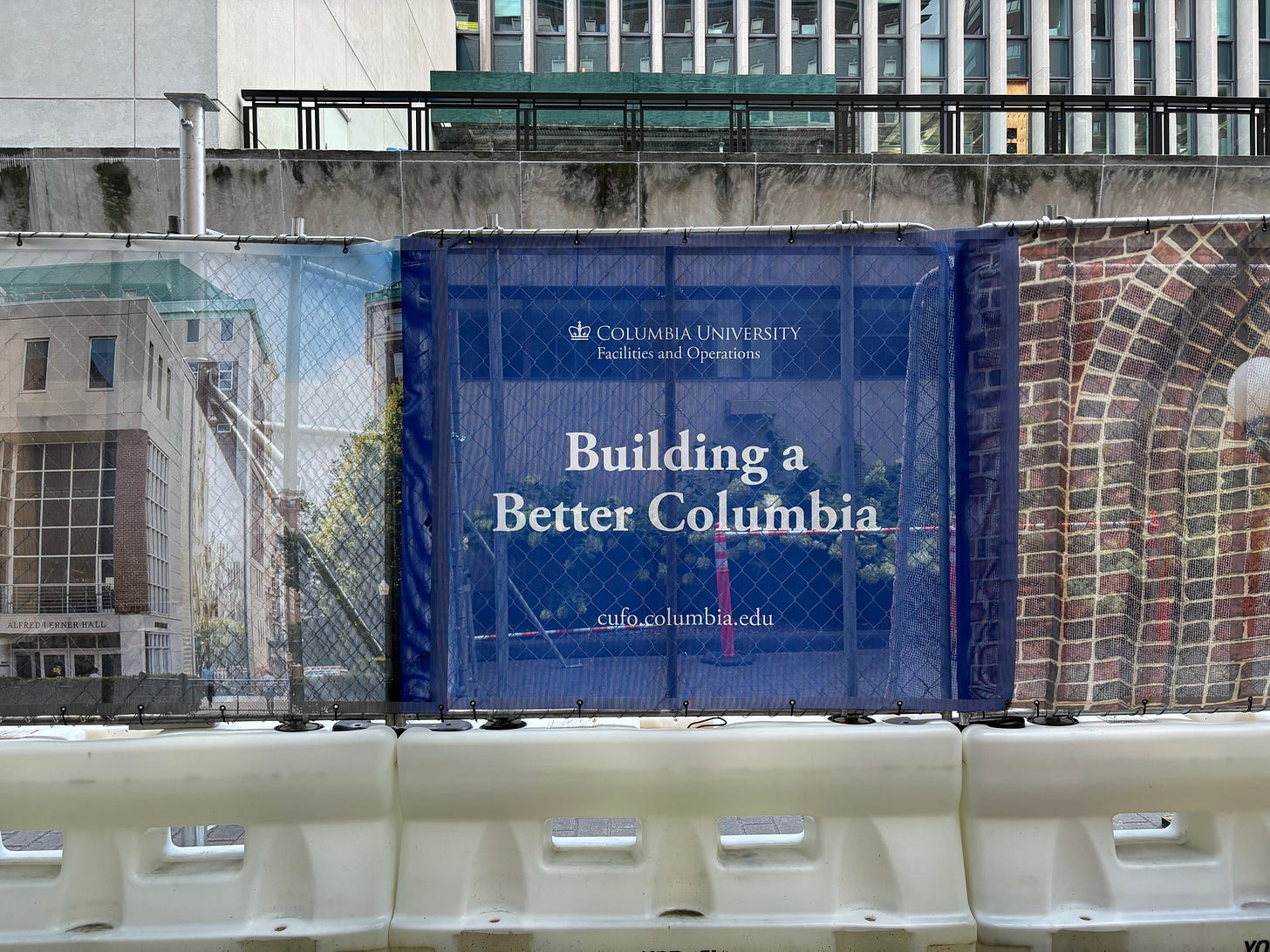Where Do We Go From Here?
Returning to an institution that is no stranger to turmoil
Dear Reader,
Whenever I am asked, “What’s it like going to school at Columbia?” I usually have two responses.
First, I tend to jump straight into how it’s often a chaotic, distressing, and politically troubling (in my personal opinion) campus—it’s also the kind of talk that makes for interesting conversation.
I might start with how this time of year in 2021, I was moving into Wallach Hall (don’t judge, it was my third choice) and eager to start my time at this institution—what I imagined would be a peaceful, orderly, and educational four years. But in early November, graduate student workers launched what would become the largest strike in the U.S., lasting 10 weeks. Thousands of classes, recitations, and office hours were canceled, including my University Writing seminar (a godsend).
Graduate students picketed on and around campus every day, banged buckets, and held regular rallies. They interrupted then-University President Lee Bollinger’s class on, of all things, the First Amendment, shouting “F*ck you, PrezBo!” My social media feeds every day were filled with strike-related infographics and other calls to action in support of the strikers, including rhetoric that demonized students who did not support strike action or the union’s tactics.
I might also mention the big scandal of my sophomore year—the U.S. News ranking debacle. In February 2022, Columbia mathematics professor Michael Thaddeus published a report questioning the accuracy of data the University was submitting to the rankings. Columbia ranked No. 2 in the 2022 National Universities report, an extraordinary rise from its No. 18 spot in 1988.
In early September, then-Provost Mary Boyce admitted some of the data “relied on outdated and/or incorrect methodologies” and released the school’s first-ever Common Data Set, days before U.S. News dropped Columbia’s ranking to No. 18. Our school was the laughingstock of the elite higher education world for a good few months.
Of course, for the scandal of my junior year, most everyone is already familiar with what transpired in Morningside Heights after October 7, 2023. For those who have just arrived at Columbia, I hope the articles and essays in this issue and the preceding issue on our website will provide an adequate analysis.
The second part of my answer to what going to Columbia is really like is quite different.
Despite all the chaos and scandals, I’ll tell people proudly that I still love this school just as I did when I first arrived in 2021 and just as I did as a high school senior. I love this school because there is a palpable intellectualism that fills the dorms and dining halls here; because students here actually read the news and engage with publications like Sundial; because despite everything, I have been reminded time and time again that there are so many students here that care about much more than just their grades or investment banking careers.
We are no strangers to national scrutiny and internal turmoil. The character of our institution means that we often find ourselves in the spotlight, but it also means that such moments spark boundless discourse (some of it ugly, yes) and intellectual engagement with all sides of an issue.
It’s true that rebuilding Columbia this time around may require more time and more work. And we may not even get the chance to rebuild immediately if encampments and widespread protests continue to strain relationships across campus. But our history as an institution, even in just the past four years, proves that we are more resilient than we often think and that conflict resolution is never too far from where we are.
In the September 2024 issue of Sundial, we have compiled a series of proposals that build on who we are as a University and where we go from here. They cover everything from the administration to the Core Curriculum to campus partying and more.
We hope there is something for everyone to agree and disagree on, and as always, our inbox (columbia.sundial@gmail.com) is open to your thoughts and letters. Sundial is dedicated to publishing stories and perspectives often overlooked on campus through our investigative journalism and engaging commentary. Especially if you are a first-year and like what you see, we invite you to join our growing team of independent journalists and writers.
For the staff,
Jonas Du
Mr. Du is the editor-in-chief of Sundial. He is a senior at Columbia College studying political science and economics. Follow him on X @jonasydu





Great article with unique point of view